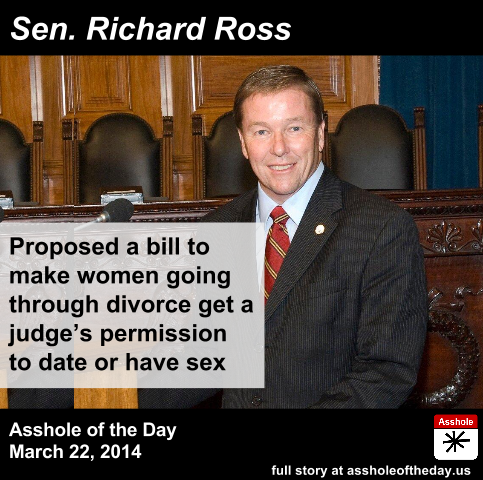I’ve seen this meme floating around a bit today on Facebook (h/t Jason), even though it’s from an article dated March 22, 2014. I wanted to set a few things straight about it. (This is adapted from a Facebook comment I left.)

The meme shows a picture of Massachusetts State Senator Richard Ross, and names him Asshole of the Day for March 22, 2014. It then states, “Proposed a bill to make women going through divorce get a judge’s permission to date or have sex.”
First of all, Sen. Ross introduced the bill at the request of a constituent, apparently based on a Massachusetts procedural rule that allows anyone to introduce legislation. The senator has stated that he does not actually endorse the bill, so I guess I really don’t understand how Massachusetts does legislating.
The meme is misleading because it only mentions women going through a divorce, and it does not mention anything about the bill only applying to divorces with children. The bill is terrible, but not for the reasons stated by the Asshole of the Day site. The change made by the bill would apply to both men and women….at least on paper. This is actually a relatively common feature of divorces with kids, in my experience (with some very important differences I’ll discuss below). Here’s the text of the amended provision:
In divorce, separation, or 209A proceedings involving children and a marital home, the party remaining in the home shall not conduct a dating or sexual relationship within the home until a divorce is final and all financial and custody issues are resolved, unless the express permission is granted by the courts.
The idea behind this, in Texas at least, is to keep the kids’ situation reasonably stable while the divorce is pending—in Texas that’s a minimum of 60 days from the filing date, but in some states it’s as much as 6-12 months. Having new significant others around while the divorce is still pending, the theory goes, is not in the “best interest of the children” (which is the gold standard in every state that I know of.)
Now, in practice, is this a good idea to have as a statute covering all divorces with children? Hell no. It assumes that children need to be shielded, and can be shielded, from the grittier details of a divorce in all cases, and that’s not remotely correct. Note that the bill doesn’t make distinctions between infants (who don’t care), the toddler-to-tween range (who would probably be the most affected), and teenagers (the wildcard). Continue reading →



